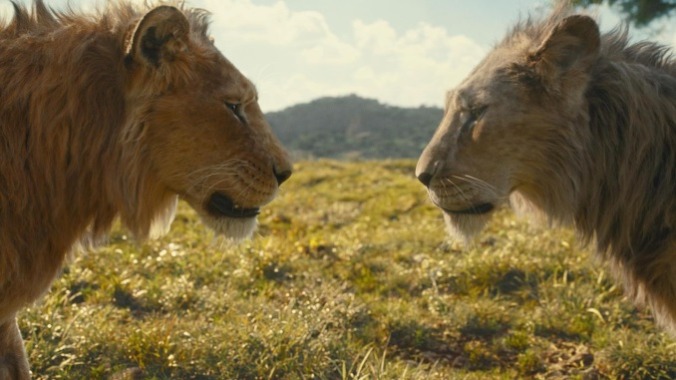Mufasa: The Lion King Throws Barry Jenkins and More Into the VR-Animal Void

The astonishing technology that the Walt Disney Company utilizes on movies like Mufasa: The Lion King is like something out of a science fiction story – specifically, a cautionary tale that features some kind of cosmic-ironic curse. Here is a virtual filmmaking rig that can conjure vast landscapes and photorealistic animal characters, allowing the artists total freedom of camera movement and image design, and yet no matter how much talent is thrown into its ravenous maw – Barry Jenkins! Lin-Manuel Miranda! A rotating/accumulating group of fabulously charismatic actors and singers! – it spits out the same lifeless talking-animal dross, while demanding further victims to fuel the creation of sequels, prequels, and, presumably, eventually higher-tech remakes of high-tech remakes.
To that end, maybe the sequel to the remake of the remake of the decade-old TV cartoon The Lion Guard will solve the problems introduced by The Lion King (2019) and inherited by Mufasa (2024). In the meantime, Jenkins (Moonlight), surely one of the most distinctly gifted of the many talented directors to submit themselves to the Disney machine, struggles more mightily than his outmatched predecessor Jon Favreau to bend this technology to his will. While Favreau was stuck un-imagining iconic moments and sequences from the 1994 animated classic, Jenkins obviously wants to use his VR movie to compose: To figure out shots, points of view, and sequences that bring these eerily realistic animals and their environments to life, even or especially if it means bending their realism a bit into something more poetic or magical. Yet no matter the effort he puts into it, Jenkins is working with the creative equivalent of vaporware; his virtual camera floats listlessly around animated lions communicating with dialogue that sounds hurried, packed into odd spaces, with a pervasive ADR quality. Of course, this is animation. All of the dialogue is looped in. What sets this apart from traditional animation is that the voices, no matter how mellifluous, and the songs, no matter how Broadway-ready, never stop feeling disembodied. These lions are living in the simulation.
Alas, what they’re doing there is not terribly interesting, though it is admittedly less tedious than last time. The story of Mufasa manages to recall both the kiddie-Shakespeare drama of the 1994 original and the chintzy framing of the direct-to-video-style sequels and spinoffs that 21st century Disney has promoted to theaters. When lion princess Kiara (Blue Ivy) is left in care of various sidekicks while her parents (Donald Glover and Beyoncé Knowles-Carter, spending a combined eight minutes in the recording booth or possibly on their Bluetooth from their limousines) attend to the birth of her new sibling, Rafiki (John Kani) favors her, along with interrupting comic relief Timon (Billy Eichner) and Pumbaa (Seth Rogen), with a family story. He offers the heretofore unseen origin of her grandfather Mufasa, memorably voiced by James Earl Jones in both previous versions of the story, and played here by Braelyn Rankins (as a cub) and Aaron Pierre (as a grown but still young lion).
-

-

-

-

-

-

-

-

-

-

-

-

-

-

-

-

-

-

-

-

-

-

-

-

-

-

-

-

-

-

-

-

-

-

-

-

-

-

-

-








































